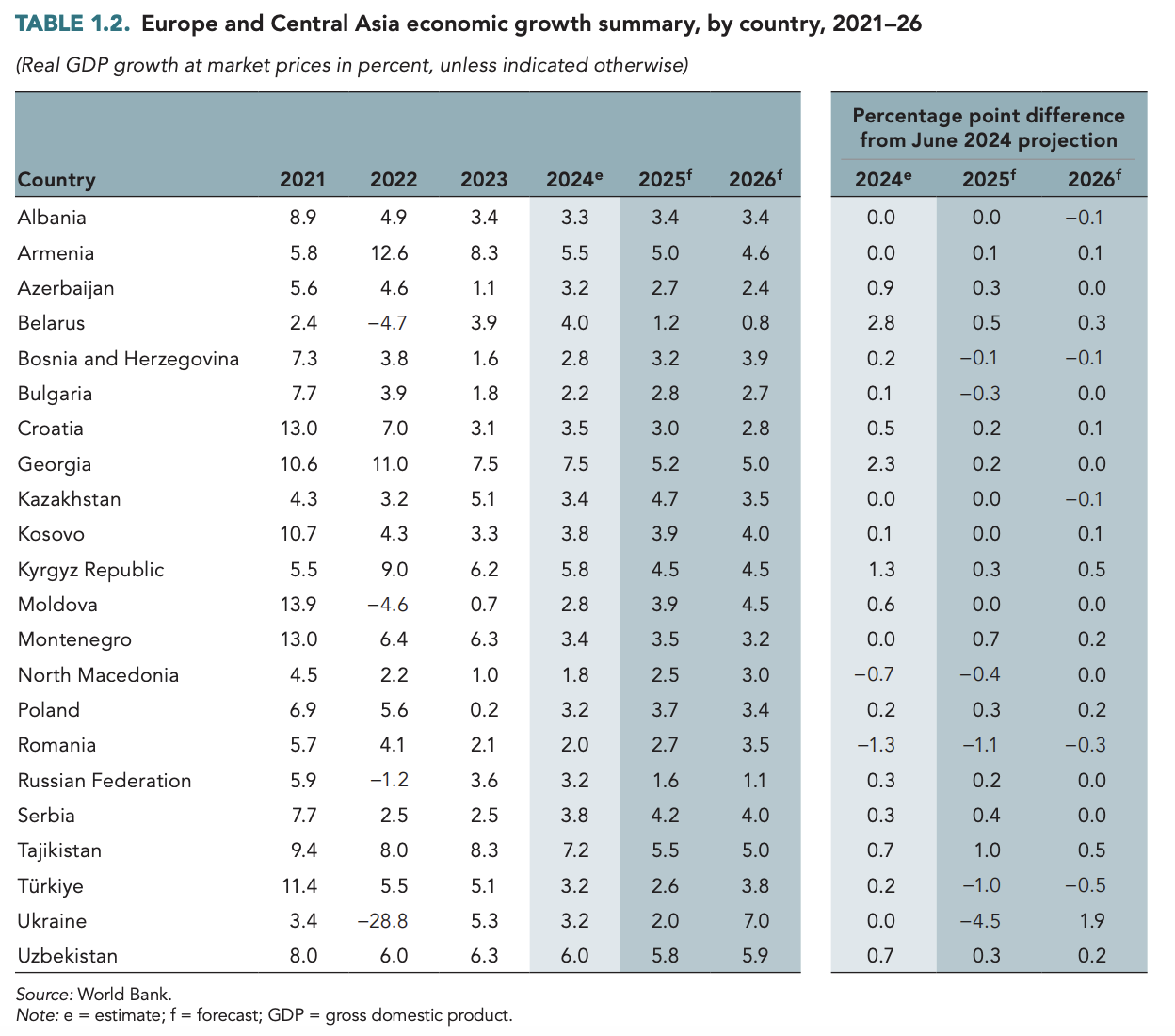“Countries of the Europe and Central Asia region have ably navigated the recent shocks of high inflation, the fallout from Russia’s invasion of Ukraine, and weak expansion in the European Union,” said Antonella Bassani, World Bank Vice President for Europe and Central Asia, of the latest World Bank Economic Update. Among these, Uzbekistan has emerged as the fastest-growing economy in Central Asia, displaying resilience and maintaining strong growth prospects despite a general regional slowdown.

Growth across Central Asia is expected to moderate in the coming years—falling from 5.6% in 2023 to 4.3% in 2024. However, Uzbekistan continues to demonstrate robust economic performance, with its growth projected to stabilize at 6.0% in 2024, only slightly down from 6.3% in 2023. In comparison, Kazakhstan, the largest economy in the region, is expected to see its growth slow to 3.4%, while Tajikistan and the Kyrgyz Republic maintain strong but lower growth rates of 7.2% and 5.8%, respectively.
Key Drivers of Uzbekistan’s Growth
Uzbekistan’s rapid growth is being driven by a combination of factors, including significant foreign investment, infrastructure development, and a growing services sector. The country’s economic strategy focuses on diversifying away from its traditional reliance on natural resources. As a result, private consumption has been a key growth factor, fueled by rising wages, government transfers, and remittance inflows—particularly from Russia. As the World Bank report notes, “Remittance inflows have remained above pre-pandemic levels and continue to support economic stability in Central Asia,” with Uzbekistan being one of the main beneficiaries.
Tourism is another sector contributing to the country’s growth. With international tourist arrivals now exceeding pre-pandemic levels, Uzbekistan has been promoting itself as a key cultural and historical destination in Central Asia. The government’s investment in promoting the country’s Silk Road heritage has positioned tourism as an emerging pillar of Uzbekistan’s economy.
The Importance of Education Reform
Despite Uzbekistan’s strong economic performance, the World Bank emphasizes that long-term growth will require significant reforms in the education sector. The report stresses the need for improving the quality of education, especially in science, technology, engineering, and math (STEM), to build the human capital necessary for sustained innovation and competitiveness.
“The greatest scope for boosting long-term growth in the region lies in raising the quality of education, especially higher education,” said Ivailo Izvorski, World Bank Chief Economist for Europe and Central Asia. While Uzbekistan has made progress in increasing enrollment rates, the quality of education has not kept pace with the country’s growing demand for skilled workers. Test scores, particularly in international assessments such as the Program for International Student Assessment (PISA), have been falling, signaling a need for urgent reforms in curricula, teacher training, and education infrastructure.
To ensure continued economic growth, Uzbekistan must align its education system with labor market needs. “Prioritizing the quality of education and supporting lifelong learning will help countries bolster their human capital, reduce talent misallocation, and drive sustainable economic growth and development,” Izvorski added.
Comparison with Regional Neighbors
While Uzbekistan remains the fastest-growing economy in Central Asia, its neighbors are experiencing more moderate growth. Kazakhstan, despite being the region’s largest economy, is expected to see its growth slow to 3.4% in 2024, down from 5.6% in 2023. This deceleration is due in part to the country’s reliance on oil exports and delays in expanding the Tengiz oil field. Meanwhile, Tajikistan and the Kyrgyz Republic are projected to grow at 7.2% and 5.8%, respectively, driven largely by remittances and domestic consumption.
Economic Outlook and Risks
Despite Uzbekistan’s impressive growth, the World Bank cautions that the country, like the rest of Central Asia, faces significant external risks. The ongoing geopolitical tensions surrounding Russia’s invasion of Ukraine continue to affect trade and remittance flows, which could slow growth if the situation worsens. However, Uzbekistan’s strategic investments in infrastructure and reforms in education provide a buffer against these external shocks.
Another potential risk is the possible slowdown in remittance inflows, particularly from Russia. Although remittances have played a critical role in supporting household consumption, economic challenges in Russia could reduce these flows, impacting domestic demand in Uzbekistan. The report also highlights that while inflationary pressures are easing, central banks in the region remain cautious about cutting policy rates, given the potential for lingering price pressures.
Conclusion
Uzbekistan’s economic growth, while moderating slightly, continues to outpace its Central Asian neighbors, positioning the country as a regional leader in resilience and future growth potential.
However, the World Bank underscores the importance of education reform to maintain this momentum. By investing in human capital and aligning educational outcomes with market needs, Uzbekistan can ensure that its rapid growth remains inclusive and sustainable.
“To achieve stronger productivity growth over the longer term, it will be important for the countries of the region to improve substantially the quality of both secondary and higher education, key for bolstering human capital and creativity,” said Izvorski. With the right reforms and investments, Uzbekistan has the potential to become one of the most dynamic economies in Central Asia and beyond.
Comments (0)